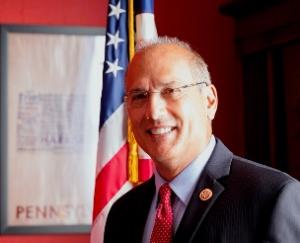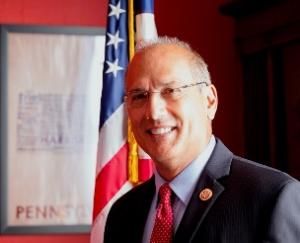Pennsylvania Republican Congressman Tom Marino reportedly gets the nod. It's not good news for progressive drug policy reform.
Nobody's selling strawberry-flavored meth to your kids, but this bill could still hurt some people.
Nothing inspires confidence like masked cops, right?
West Virginia is poised to become the next medical marijuana state, New Mexico's GOP governor vetoes a bill that would have allowed medical marijuana for opioid addiction, Ohio takes another step toward getting its system up and running, and more.
The Uruguayan government sets the date for legal marijuana sales in pharmacies to begin, West Virginia is just a governor's signature away from becoming the 29th medical marijuana state, Idaho's Republican governor vetoes a broadly-supported asset forfeiture reform bill, and more.
Congressional drug policy reform bills are piling up, New Mexico's GOP governor vetoes medical marijuana and overdose prevention bills, Canada's Liberals roll out their marijuana legalization bill Thursday, and more.
A Colorado bill barring co-op grows heads to the governor, an Oregon bill aimed at protecting marijuana consumers and an Iowa bill reforming asset forfeiture go to their governors, Trump reportedly names a new drug czar, and more.
The US attorney general admits being surprised that people don't like his stance on marijuana, Vermont's legalization bill is on a death watch, Illinois legalizers gear up, and more.
President Trump will name Pennsylvania Congressman Tom Marino (R) to head the Office of National Drug Control Policy (ONDCP -- the drug czar's office), CBS News reported Tuesday. The White House gave no official comment, but sources told CBS that an official announcement would come soon.

Reported drug czar nominee Rep. Tom Marino (R-PA) (marino.house.gov)
Marino's legacy of legislative achievements around drug policy offers little comfort to reformers looking for signs that the "law and order" theme of the Trump administration may not be as bad as it sounds. Marino is a former prosecutor now in his third term in the House. His 2016
Transnational Drug Trafficking Act expands the ability of US prosecutors to use extraterritoriality to go after international drug traffickers, but while the law is touted as aiming at "kingpins," but
observers south of the border have argued that the law "targets people on the lowest rungs of the trafficking ladder, i.e. Colombia's coca farmers." Marino has also been a reliable vote in
opposition to marijuana reform in Congress.
Marino's rural congressional district has seen rising concern about heroin and opioids, and he serves on the House bipartisan committee combating the opioid epidemic. A bill he was an author and key supporter of in that area may suggest a more complex picture -- the 2016 Ensuring Patient Access and Effective Drug Enforcement Act, which supporters characterized as balancing the needs of patients, the pharmaceutical industry, and law enforcement, but which critics describe as a means of undercutting the DEA's ability to hold pharmaceutical drug distributors accountable for the diversion of large amounts of opioid pain relievers.
The ability of pain patients to have access to the drugs that can help them is a continuing -- and under-covered -- issue in the debate around prescription opioids. So is the ability of physicians to appropriately prescribe them within running afoul of regulatory authorities or even drug enforcement authorities. If Marino's bill reflects a concern with such issues, or a more general willingness to treat DEA pronouncements on such matters with skepticism, that could be useful. Conversely, however, the nation is also in the midst of a much more well-covered increase in the misuse of opioids. ONDCP has a role to play in promoting public health measures that can reduce overdoses and the risk of addiction. If Marino is too deferential to the preferences of big pharma lobbyists, while otherwise hooked on hard-line drug war approaches, opportunities to advance positive approaches for reducing the risks that go with opioids may be squandered.
In the fight over the 2016 Act, Marino, as chairman of the House Judiciary Committee on Regulatory Reform, clashed repeatedly with DEA Office of Diversion Control head Joseph Rannazzisi. In a 2014 conference call with congressional staffers, Rannazzisi warned that the bill, backed by a pharmaceutical industry lobbying campaign, would protect corporations engaged in criminal activity.
"[If t]his bill passes the way it's written we won't be able to get immediate suspension orders, we won't be able to stop the hemorrhaging of these drugs out of these bad pharmacies and these bad corporations," Rannazzisi recalled telling them. "What you're doing is filing a bill that will protect defendants in our cases."
Rannazzisi's opposition infuriated Marino, who ripped into the veteran DEA official's boss, then-DEA Administrator Michele Leonhart at a congressional hearing later that year.
"It is my understanding that Joe Rannazzisi, a senior DEA official, has publicly accused we sponsors of the bill of, quote, 'supporting criminals,' unquote" Marino said. "This offends me immensely."
A week later, Marino and Rep. Marsha Blackburn (R-TN) demanded that the Justice Department Office of the Inspector General investigate Rannazzis for "intimidating" members of Congress. Rannazzissi was replaced and retired in October 2015.
Marino's record is good enough for anti-marijuana crusader and former ONDCP advisor Kevin Sabet of Smart Approaches to Marijuana (Project SAM). "My understanding is that Tom has a deep understanding of the issue and is excited to get started," he enthused to CBS News.
But it's not good enough for anyone interested in a truly progressive approach to drug policy.
back to top
The two octogenarian senior members of the Senate Judiciary Committee are up to one of their favorite pastimes again this year. Sens. Dianne Feinstein (D-CA) and Chuck Grassley (R-IA) have reintroduced a perennial bill that would increase penalties for drug dealers who sell products designed to entice children.

"Ecstasy bracelets" (non-edible) (Pinterest)
If the bill were to become law, anyone who knew or "had reasonable cause to believe" that a "modified controlled substance would be distributed to a minor" would be looking at a
10- to 20-year prison sentence.
But the bill, the "Protecting Kids from Candy-Flavored Drugs Act of 2017" (Senate Bill 739), is seemingly justified more by urban myths than facts and, critics say, both unnecessary and more likely to be used against real-life sellers of marijuana edibles than mythical strawberry-flavored meth dealers.
"There are many instances of of drug dealers altering flavor and packaging of cocaine or methamphetamines to appeal to children," Feinstein tweeted as the bill rolled out late last month.
"Law enforcement reports that drug dealers frequently combine drugs with chocolate or fruit flavors or package the drugs to look like candy or soda to attract youth," the senators claimed in a joint statement. "For example, there are reports of candy bracelets containing ecstasy; gummy bears laced with Xanax; and candy laced with THC."
"Cynical criminals take advantage of drug trends in the general population to market dangerous illicit drugs specifically to kids," Grassley added in a separate press release. "It could be marijuana, methamphetamine, cocaine or something else. The criminals are innovative, and the law should keep up with them. Federal law should make crystal clear that marketing potentially lethal drugs to kids will have steep consequences."
The problem for Feinstein and Grassley, who have unsuccessfully filed the bill three times before, is that the crisis they wish to solve largely doesn't exist. The first time around, they were inspired by media reports of strawberry-flavored meth, but those have been roundly debunked as myths.
Some of their other claims are even more ludicrous. "Gummy bears laced with Xanax" seem only to be found on the furthest fringes of the web (a Reddit user subforum, to be precise) dedicated to bored drug hobbyists with too much time on their hands.
And the "candy bracelets containing ecstasy" claim appears to be based on a misreading of raver culture percolated through a concerned parents group.
"People (especially at Raves) have started wearing bracelets lined with ecstasy as opposed to the old candy bracelets kids used to wear," warned something called Careful Parents. "Much like the candy bracelets of old, people can eat the drug right off the bracelets. Google images of these bracelets for a better idea of what they look like and be on the lookout if your kids like to go to Raves."
But that warning was based on a 10-year-old story about rave culture in the Seattle Times -- a story that indeed mentioned bracelets and ecstasy and "candy kisses" (the sharing of beaded bracelets), but did not claim that the bracelets were made of ecstasy. The wearing of colorful bracelets is part of rave culture, but ecstasy bracelets are a myth based on misunderstanding.
The idea of drug dealers peddling candy-flavored drugs to kids may be an old bugaboo, but it just doesn't make much economic sense, said Sanho Tree, director of the Drug Policy Project at the Institute for Policy Studies.
"Those are not popular commodities to sell to children," he told ATTN:. "Why risk already severe penalties for some kid's lunch money?"
"This reminds me of the horror stories that you hear every Halloween -- where you have people handing out these infused products to children," Daniel Shortt, an attorney who focuses on cannabis law at the firm Harris Bricken, told ATTN:. "There's really no data supporting that that happens."
While candy-flavored meth or ecstasy bracelets are mythical, marijuana edibles and beverages are not. They are sold legally under state laws in medical and adult legal marijuana states, but the text of the bill could certainly be interpreted as aiming at them as well. It specifies that it would apply to people who sell federally illegal drugs to minors that are:
Combined with a beverage or candy product,
Marketed or packaged to appear similar to a beverage or candy product, orModified by flavoring or coloring to appear similar to a candy or beverage product.
"That's broad," Shortt said. "I worry about how that could applied to marijuana-infused edibles."
Edibles are often infused in candies, cookies, and chocolates, as well as brightly packaged beverages. It's not strawberry-flavored meth dealers who are likely to be caught up if this bill ever passes -- since they don't exist -- but people selling pot brownies and the like, in the black market or in the legal pot shop, who sell to minors, either knowingly or inadvertently.
back to top
As part of his effort to fight heroin trafficking, Lake County, Florida, Sheriff Peyton Grinnell has released a video pledging to go after drug dealers, but the effort from the sheriff's "Community Engagement Unit" is both creepy and wrong-headed.
The video features the sheriff surrounded by four masked officers, their eyes hidden behind sunglasses, their torsos protected by bullet-proof vests, wearing the olive green pants of the military -- not the blue of law enforcement. They look like some sort of paramilitary hit squad, and that's what Sheriff Grinnell promises they will be.
"To the dealers that are pushing this poison, I have a message for you," the glowering sheriff warns. "We're coming for you. As a matter of fact, our undercover agents have already bought heroin from many of you… To the dealers, I say: Enjoy looking over your shoulder, constantly wondering if today is the day we come for you. Enjoy trying to sleep tonight as you wonder if tonight's the night our SWAT team blows your door off its hinges."
The message is presumably designed to be reassuring for the good citizens of Lake County, but the sheriff's promise of increased resort to paramilitarized, high-intensity, middle-of-the-night drug raids is anything but, given the record of SWAT raid errors over the years.
The New York Times recently reported that in the past six years alone, at least 81 civilians and 13 cops have been killed in "dynamic entry" raids, oftentimes after police obtained a "no-knock" warrant allowing them to bust in a door and go in heavy without warning. And as the Washington Post noted in a roundup of SWAT raid mishaps last fall, such mistakes -- sometimes fatal -- continue to occur with depressing regularity.
But even when no one is killed and no headlines are made, mistaken SWAT raids corrode public confidence. Families whose children are subjected to screaming masked intruders kicking their doors down in the middle of the night and pointing guns at their heads are likely to be traumatized for years even if the cops say "sorry."
Bad raids happen for a variety of reasons. An informant may lie to score points with the cops. The cops might hit the wrong address by mistake. Or they may hit the right address, but without necessary information about who they may encounter, as was the case with the notorious 2014 Georgia raid where a SWAT member threw a flashbang grenade into a baby's crib and blew a hole in the 19 -- month-old's chest, nearly killing him. (Police in this case were also acting on a bad informant's tip.)
Heroin is a serious problem, and it is illegal. We expect police to enforce the law, but there has to be a better way than treating drug suspects like they're ISIS terrorists or Iraqi insurgents. What ever happened to, "We've got the place surrounded. Come out with your hands up!"?
Here's the video:
back to top
West Virginia is poised to become the next medical marijuana state, New Mexico's GOP governor vetoes a bill that would have allowed medical marijuana for opioid addiction, Ohio takes another step toward getting its system up and running, and more.
ArizonaLast Thursday, the Court of Appeals struck down the criminal ban on possession of medical marijuana on college campuses. The state Court of Appeals ruled that even though colleges and universities can bar the possession of medical marijuana through administrative means, the state cannot make on-campus possession a criminal offense. The state's medical marijuana law barred its possession in prisons, schools, and on school buses, but the legislature in 2012 added college campuses to the list. Now, the appellate court has ruled the state couldn't do that. The case is Arizona v. Maestes.
Indiana
Last Friday, the legislature approved CBD cannabis oil bills. Both houses of the legislature have approved measures allowing for expanded access to CBD cannabis oil But Senate Bill 15 and House companion legislation now have differences in the percentages of chemicals allowed, so the bills must go to conference committee to hammer out the differences.
Montana
On Monday, the medical marijuana regulatory bill was dramatically amended, and advocates were unhappy. A bill aimed at setting up a new regulatory framework for medical marijuana in the state was radically overhauled in a House committee -- and supporters of the original measure are not pleased. The measure, Senate Bill 333, saw 20 amendments attached by the House Taxation Committee, including amendments that changed the taxing structure, before that committee sent it to the House floor. The bill has already passed the Senate, and if the bill passes the House, a conference committee will be necessary to try to reconcile the differences.
New Hampshire
On Tuesday, medical marijuana bills got a hearing. Measures that would add new qualifying medical conditions and allow patients to grow their plants got a hearing in the Senate Tuesday. The bills have already passed the House. No votes were taken, though.
New Mexico
Last Friday, the governor vetoed a bill that would have allowed opioid addicts to use medical marijuana. Gov. Susana Martinez (R) vetoed a measure that would have improved the state's medical marijuana last Friday. House Bill 527 would have allowed people diagnosed with an opioid use disorder to use medical marijuana. In her veto message, Martinez wrote that allowing people addicted to opioids to seek medical marijuana "will likely cause a rapid increase in program enrollment, which the program is currently unable to sustain." But critics called that reasoning bogus, noting that the state Health Department sets the number of licensed producers and the amount they can grow.
North Carolina
Last Tuesday, a full-fledged medical marijuana bill was filed. State Sens. Teresa Van Duyn (D) and Valerie Jean Fousher (D) filed Senate Bill 648. Under the bill, patients could possess up to 24 ounces of marijuana and grow up to 250 square feet of their own medicine. The bill would also establish a system of licensed cultivation centers and dispensaries. It has been referred to the Committee on Rules and Operations.
Ohio
Last Friday, the state announced it would start accepting grower applications in June. The state Department of Commerce will begin accepting applications for 24 medical marijuana grow licenses beginning in June, the department announced. Once licenses are awarded, holders will have nine months to meet all requirements. Application forms and instructions should be released in the next two to three weeks, the department said.
West Virginia
Last Thursday, the medical marijuana bill passed the legislature. The Mountaineer State is poised to become the 29th medical marijuana state after the legislature gave final approval to Senate Bill 386, sending the measure to the desk of Gov. Jim Justice (D). The bill would set up a dispensary system, but does not authorize patients to smoke marijuana or grow their own.
[For extensive information about the medical marijuana debate, presented in a neutral format, visit MedicalMarijuana.ProCon.org.]
back to top
The Uruguayan government sets the date for legal marijuana sales in pharmacies to begin, West Virginia is just a governor's signature away from becoming the 29th medical marijuana state, Idaho's Republican governor vetoes a broadly-supported asset forfeiture reform bill, and more.
Marijuana PolicyMontana Bill to Study Marijuana Legalization Filed. State Rep. Mary Dunwell (D-Helena) filed House Joint Resolution 35 on Thursday. The bill calls for "a study of the legalization and control of marijuana," with results to be reported to the next session of the legislature. The study would include input from the Departments of Public Health and Human Services, Justice, Revenue, and Agriculture, as well as local law enforcement, courts, schools, and lobbying groups.
Medical Marijuana
Arizona Appeals Court Strikes Down Criminal Ban on Possession of Medical Marijuana on College Campuses. The state Court of Appeals ruled on Thursday that even though colleges and universities can bar the possession of medical marijuana through administrative means, the state cannot make on-campus possession a criminal offense. The state's medical marijuana law barred its possession in prisons, schools, and on school buses, but the legislature in 2012 added college campuses to the list. Now, the appellate court has ruled the state couldn't do that. The case is Arizona v. Maestes.
Ohio Medical Marijuana Grower Applications Will Be Accepted Starting in June. The state Department of Commerce will begin accepting applications for 24 medical marijuana grow licenses beginning in June, the department announced on Friday. Once licenses are awarded, holders will have nine months to meet all requirements. Application forms and instructions should be released in the next two to three weeks, the department said.
West Virginia Medical Marijuana Bill Heads to Governor's Desk. The Mountaineer State is poised to become the 29th medical marijuana state after the legislature gave final approval to Senate Bill 386 Thursday, sending the measure to the desk of Gov. Jim Justice (D). The bill would set up a dispensary system, but does not authorize patients to smoke marijuana or grow their own.
Heroin and Prescription Opioids
Kentucky Bill to Raise Heroin, Fentanyl Penalties Awaits Governor's Signature. The General Assembly last week approved House Bill 333, which would increase penalties for the sale of heroin, fentanyl, or carfentanil. Under current laws, adopted as sentencing reform measures in 2011, traffickers face one to five years in prison. Under this bill, they would face five to 10 years in prison. The bill is currently on the desk of Gov. Matt Bevin (R).
Asset Forfeiture
Idaho Governor Vetoes Asset Forfeiture Reform. Gov. Butch Otter (R) on Thursday vetoed House Bill 202, a civil asset forfeiture reform bill that passed the legislature with broad bipartisan support. The bill would have ended asset forfeiture absent a criminal conviction, as well as imposing reporting and other requirements on law enforcement. The governor insisted there is no problem to fix, although lawmakers clearly disagreed.
Drug Policy
Beto O'Rourke Leads Bipartisan Bill that Repeals Federal Transportation Law Requiring States to Suspend Driver's Licenses for Drug Offenses. US Rep. Beto O'Rourke (D-TX) and five bipartisan cosponsors have filed House Resolution 1952, which would repeal a 26-year-old federal law that mandates states to automatically suspend driver's licenses for anyone convicted of a drug offense or risk losing federal highway aid money. Some 38 states have already opted out of that program, but 12 states -- including Texas, New York, Michigan, and Florida -- still comply with the requirement.
Rand Paul, Elijah Cummings File Bills to Seal Criminal Records for Federal Nonviolent Offenses. US Sen. Rand Paul (R-KY) and US Rep. Elijah Cummings (D-MD) have filed identical bills in the Senate and House to seal the federal criminal records of non-violent offenders, which includes tens of thousands of federal drug offenders. The measures are Senate Bill 827 and House Resolution 190, respectively.
International
Uruguay to Allow Marijuana Sales at Pharmacies Beginning in July. The office of President Tabare Vasquez said Thursday that legal marijuana sales through pharmacies will begin in July. That's the last step in implementing a 2013 law that made Uruguay the first country to legalize marijuana. While other parts of the law have been in place, pharmacy sales had been on hold under Vasquez, who isn't nearly as enthusiastic about legalization as was his predecessor, Jose "Pepe" Mujica, who shepherded the law to passage during his term. A gram of weed will go for $1.30.
Four Out of Five French Presidential Candidates Support Marijuana Reform. The leading candidate, centrist Emmanuel Macron, and the rightist candidate, Francois Fillon, both support decriminalizing marijuana possession, leftist candidates Jean-Luc Melenchon and Benoit Hamon have both called for marijuana legalization, while only far-right candidate Marine LePen favors the status quo, which calls for up to a year in jail for the possession of any drug.
back to top
Congressional drug policy reform bills are piling up, New Mexico's GOP governor vetoes medical marijuana and overdose prevention bills, Canada's Liberals roll out their marijuana legalization bill Thursday, and more.

A federal marijuana rescheduling bill has been filed. (Wikimedia)
Congressmen Gaetz and Soto Propose Legislation to Reschedule Marijuana, Two Florida GOP congressmen, Reps. Matt Gaetz and Darren Soto, have filed House Resolution 2020, "to provide for the rescheduling of marijuana into schedule III of the Controlled Substances Act." Rescheduling would make it easier to conduct research into medical marijuana, the congressmen said. "This drug should not be in the same category as heroin and LSD, and we do not need to continue with a policy that turns thousands of young people into felons every year," Gaetz added.
Medical Marijuana
Indiana Legislature Approves CBD Cannabis Oil Bills. Both houses of the legislature have approved measures allowing for expanded access to CBD cannabis oil But Senate Bill 15 and House companion legislation now have differences in the percentages of chemicals allowed, so the bills must go to conference committee to hammer out the differences.
New Mexico Governor Vetoes Medical Marijuana Changes. Gov. Susana Martinez (R) vetoed a measure that would have improved the state's medical marijuana law last Friday. House Bill 527 would have allowed people diagnosed with an opioid use disorder to use medical marijuana. In her veto message, Martinez wrote that allowing people addicted to opioids to seek medical marijuana "will likely cause a rapid increase in program enrollment, which the program is currently unable to sustain." But critics called that reasoning bogus, noting that the state Health Department sets the number of licensed producers and the amount they can grow.
Heroin and Prescription Opioids
West Virginia Legislators Approve Overdose Monitoring, Creation of Office of Drug Policy. The legislature has approved Senate Bill 2620, which would create a statewide program to monitor drug overdoses and establish an office of drug control policy to coordinate the response to the heroin and opioid crisis. The bill now goes to the desk of Gov. Jim Justice (D).
Harm Reduction
Kansas Governor Signs Naloxone Access Bill. Gov. Sam Brownback (R) last Friday signed into law House Bill 2217, which will allow first responders to administer the opioid overdose drug naloxone and which also allows pharmacists to dispense the drug without a prescription. Kansas was one of only three states without a naloxone access law, and the bill passed both houses unanimously.
New Mexico Governor Vetoes Overdose Prevention Bill. Gov. Susana Martinez vetoed Senate Bill 47, the 911 Good Samaritan Overdose Prevention Act, on Friday. The bill would have expanded the state's existing Good Samaritan law to include alcohol-related overdoses and to limit the prospect of arrest of people, who are on probation or parole or who have a restraining order, when they call 911 on behalf of someone experiencing a drug or alcohol overdose. The bill passed the Senate unanimously and the House by a 58-5 vote.
Law Enforcement
Sheila Jackson Lee Files Bill to Raise Evidentiary Standards for Federal Drug Offenses. US Rep. Sheila Jackson Lee (D-TX) has filed House Resolution 1979 "to increase the evidentiary standard required to convict a person for a drug offense, to require screening of law enforcement officers or others acting under color of law participating in drug task forces, and for other purposes." The bill text is not yet available on the congressional website. The bill has been referred to the House Judiciary Committee.
Reentry
Corey Booker, Elijah Cummings File Federal "Ban the Box" Bills. US Sen. Cory Booker (D-NJ) and US Rep. Elijah Cummings (D-MD) have filed identical bills in the Senate and House that would prevent employers from asking about applicants' criminal backgrounds until a job offer has been made. The bill would only apply to government agencies and federal contractors. The Senate measure is Senate Bill 842; its House companion is House Bill 1906. The bill text is not yet available on the congressional website.
International
Canada Marijuana Legalization Bill to Be Unveiled Thursday. The governing Liberals will roll out their marijuana legalization bill on Thursday, a "senior government source" said Monday. The government has said it wants legal marijuana to be a done deal on or before July 1, 2018.
back to top
A Colorado bill barring co-op grows heads to the governor, an Oregon bill protecting marijuana consumers and an Iowa bill reforming asset forfeiture go to their governors, Trump reportedly names a new drug czar, and more.

Trump has reportedly named Rep. Tom Marino (R-PA) to head the Office of National Drug Control Policy. (marino.house.gov)
Colorado Legislature Approves Banning Co-op Grows. The state Senate voted unanimously Monday to approve House Bill 17-1771, which makes it a criminal offense to grow recreational marijuana for other people. The House approved the measure earlier. Gov. John Hickenlooper (D) supported the bill and is expected to sign it.
Oregon Bill Would Shield Marijuana User Data from Federal Officials. The legislature has approved a bill that would protect marijuana consumers by ending the state practice of collecting point-of-sale identification information. The measure now goes to Gov. Kate Brown (D), who is expected to sign it.
Rhode Island Legalization Bill Hearing Today. The House Judiciary Committee was set to hold a hearing on a marijuana legalization measure, House Bill 5555, on Tuesday. The bill would legalize the consumption and cultivation of marijuana by adults and set up a system of legal, regulated marijuana commerce.
Tennessee Bill to Reduce Penalty for Small Amounts of Marijuana Fails. A bill that would have increased the amount of marijuana for which simple possession could be charged from one-half ounce to one ounce has died in the legislature. House Bill 0109 lost by one vote in the House on Monday.
Dallas City Council to Vote on Decrim Ordinance Wednesday. The city council will vote Wednesday on a proposal to decriminalize the possession of up to four ounces of marijuana. The city says it hopes to reduce jail time for nonviolent offenders and free officers for more serious policing priorities.
Medical Marijuana
Montana House Amends Regulation Bill, Advocates Unhappy. A bill aimed at setting up a new regulatory framework for medical marijuana in the state was radically overhauled in a House committee Monday -- and supports of the original measure are not pleased. The measure, Senate Bill 333, saw 20 amendments attached by the House Taxation Committee, including amendments that changed the taxing structure, before that committee sent it to the House floor. The bill has already passed the Senate, and if the bill passes the House, a conference committee will be necessary to try to reconcile the differences.
Asset Forfeiture
Iowa Legislature Approves Civil Asset Forfeiture Reform. The legislature has approved Senate File 446, which bars civil asset forfeiture for cash or property valued at less than $5,000 and raises the standard of proof required for asset seizure from "a preponderance of the evidence" to "clear and convincing evidence." The bill now heads to the desk of Gov. Terry Branstad (R) for final approval.
Drug Policy
President Trump Reportedly Names Congressman Tom Marino as Drug Czar. CBS News has reported that President Trump will name Rep. Tom Marino (R-PA) to head the Office of National Drug Control Policy (ONDCP -- the drug czar's office). Marino is a former prosecutor now in his third term who has cosponsored at least two major drug policy bills, the Transnational Drug Trafficking Act and the Ensuring Patient Access and Effective Drug Enforcement Act, both of which have their critics.
International
The Industry and Trade Ministry has proposed allowing the cultivation of opiates for medicine production. It has prepared a bill for the Duma take up. The notion has already been explored by federal executive bodies and apparently has their go-ahead.
back to top
The US attorney general admits being surprised that people don't like his stance on marijuana, Vermont's legalization bill is on a death watch, Illinois legalizers gear up, and more.

Who knew marijuana legalization was popular? (senate.gov)
Jeff Sessions "Surprised" By Opposition to His Marijuana Stance. At a speech at Luke Air Force Base in Arizona Tuesday, Attorney General Jeff Sessions pronounced himself "surprised" that his position against marijuana was drawing criticism. "When they nominated me for attorney general, who would have thought the biggest issue in America was when I said, 'I don't think America's going to be a better place if they sell marijuana at every corner grocery store?,'" Sessions asked. "They didn't like that; I'm surprised they didn't like that."
Hawaii Bill Would Roll Back Nation's Toughest Drug Paraphernalia Laws. Under current Hawaii law, possession of a pipe or bong for marijuana is punishable by up to five years in prison and a $10,000 fine, but perhaps not for long. A measure that would decriminalize marijuana paraphernalia, House Bill 1501, passed the Senate Tuesday. The bill has already been approved by the House, but differences in the amount of fines allowed will have to be ironed out in conference committee.
Illinois Legalization Backers Unveil Statewide Coalition. State Sen. Heather Steans (D) and Rep. Kelly Cassidy (D), the legislators behind the marijuana legalization bill, House Bill 2353, announced Tuesday that the bill would get a first hearing next week and that they had formed a statewide coalition, the Coalition for a Safer Illinois to garner public and legislative support.
Vermont Legalization Bill on Verge of Death. The prospects for the Green Mountain State legalizing marijuana this year grow exceedingly dim. Senate leaders said Tuesday their body is extremely unlikely to support a legalization measure, House Bill 170, currently stuck in the House. Proponents in the House had hoped they could get it moving again, but Senate President Pro Tem Tim Ashe said even if it passed the House, it still faced "insurmountable obstacles" in the Senate. The House bill would only legalize possession and personal cultivation -- not commercial marijuana -- while the Senate wants a regulated market.
Medical Marijuana
New Hampshire Medical Marijuana Bills Get Hearing. Measures that would add new qualifying medical conditions and allow patients to grow their plants got a hearing in the Senate Tuesday. The bills have already passed the House. No votes were taken, though.
back to top








